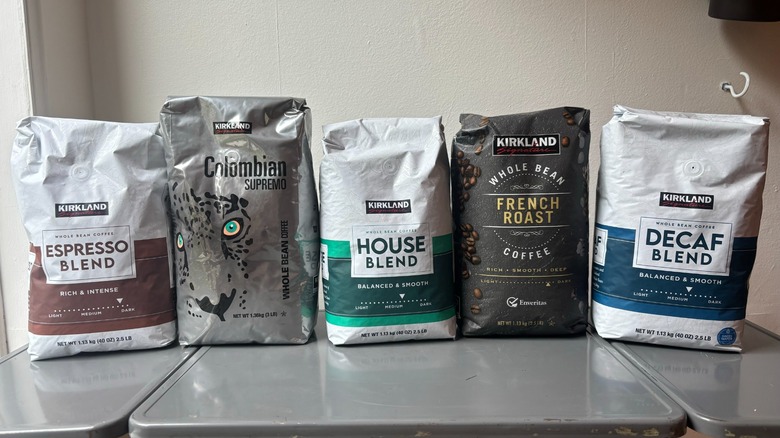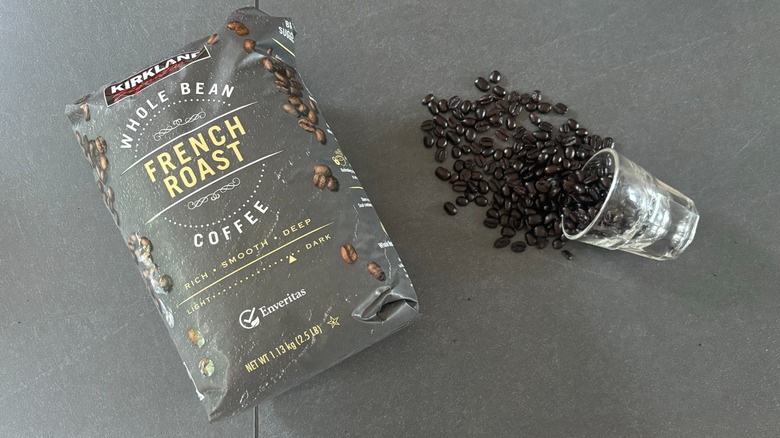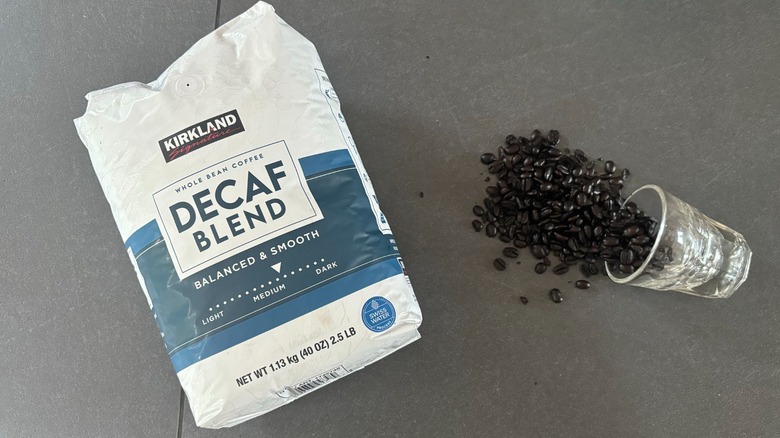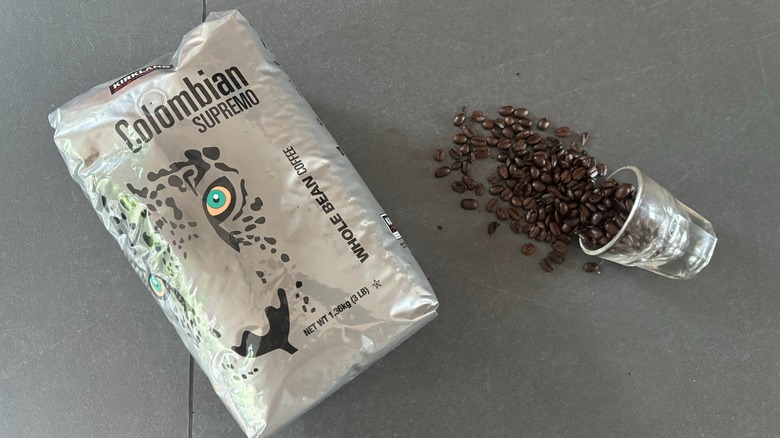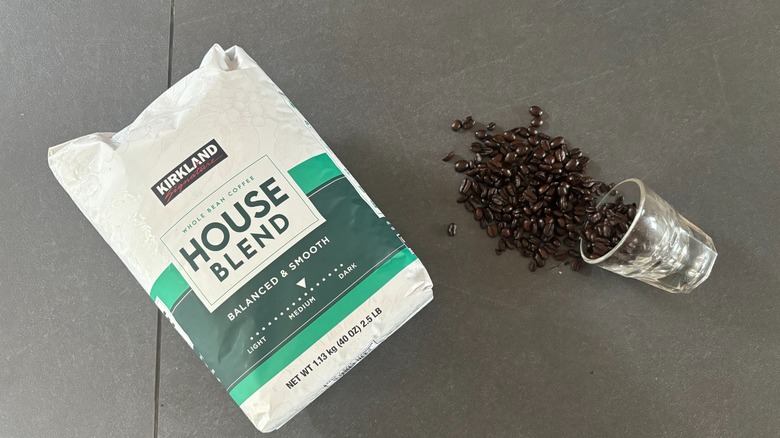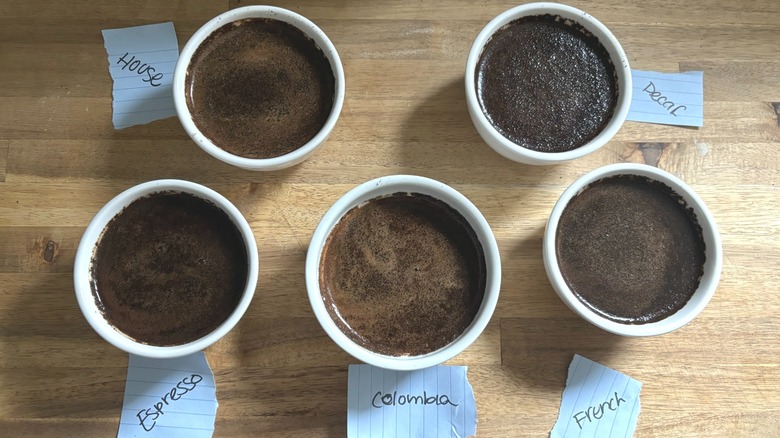5 Kirkland Signature Whole-Bean Coffees, Ranked Worst To Best
Caffeine fiends who are fans of buying in bulk have likely tried one (or more) of Costco's Kirkland Signature coffee selection. The wholesaler doesn't exclusively carry its own brand — in fact, coffee from popular chains like Starbucks and Peet's are also featured on its shelves — but given that Costco's Kirkland Signature brand offers quality products that are generally cheaper than other options at the big-box store, it's reasonable to opt for its beans when picking up a bag on the fly.
Wondering who makes Costco's Kirkland Signature brand coffee? Until recently, Starbucks roasted its beans. However, by early 2024 a subtle packaging change omitted the Starbucks logo, leaving consumers unclear as to whether Kirkland's java is still being roasted by the Starbucks team.
Regardless of where, how, and by whom it's roasted, when it comes to Kirkland coffee, you'll likely find at least a few options to choose from when you head into the store. As a barista with over six years of specialty coffee experience, I wanted to taste-test a selection of five Kirkland whole-bean coffees: its House Blend, Espresso Blend, Decaf Blend, French Roast, and Colombian Supremo. After grabbing a bag of each and evaluating them using the coffee industry's cupping practice, I became familiar with the flavor profiles of each and am here to tell you how they rank.
5. Kirkland Signature French Roast
I was nervous when, upon opening each bag of Kirkland coffee, I was confronted with visibly oily beans that even left residue on my hands. Though it's natural for oils to exude from coffee beans due to the way oxygen interacts with them, visibly oily beans often indicate over-roasting, or that the coffee has sat on the shelf for too long. The black, oily beans of Kirkland Signature French Roast coffee were the worst culprit of the bunch — it was immediately apparent that the beans had been roasted to such an extent that I didn't expect to taste much of a notable flavor profile.
Unfortunately, my suspicions were correct, which is why Kirkland's French Roast comes in at the bottom of this list. This was, by far, the blandest coffee that I tried, with an underwhelming flavor profile that could only be described as bitter. If you prefer your coffee black or with minimal accoutrements, I advise against opting for these beans. However, this could be a decent enough coffee to use in heavily flavored drinks, like a sweet coffee milkshake, a Starbucks-inspired caramel macchiato martini, or even as an extra ingredient the next time you make a batch of brownies.
4. Kirkland Signature Decaf Blend
Ranking only slightly higher than Kirkland's French Roast is the brand's Decaf Blend. These beans have a couple things going for them, but what's most notable is that it's not immediately apparent that this coffee lacks caffeine. Decaf often tastes different than regular java due to the way how coffee is decaffeinated, when a chemical process is used to strip the beans of their caffeine. This can leave the coffee tasting blander, and a bit more muted than coffee that hasn't gone through this decaffeination process.
The only indication that Kirkland's Decaf Blend was bereft of caffeine was the coffee's slightly watery flavor, but otherwise it was palatable, even when drank black. Similarly to the French Roast, there isn't really any type of flavor profile to write home about. If anything, this was tastier than the French Roast purely because its bitterness didn't pack such a strong punch. However, I've had some horrible decaf blends, and Kirkland's is by no means the worst I've ever tasted. It's an okay choice if you crave coffee but can't have the caffeine; otherwise, you're better off opting for one of the following selections.
3. Kirkland Signature Espresso Blend
Given that espresso blends are often meant to be used in drinks that feature some combination of espresso and milk, I didn't dock points when the strength of Kirkland's Espresso Blend nearly overwhelmed my taste buds. The full-bodied beans even gave the coffee a slightly thicker mouthfeel than the other selections, but I wasn't mad about it — after all, espresso needs to be strong enough to hold up against the milk and other flavors it's likely to be paired with. In case you aren't familiar with tips for picking espresso beans, you typically want a darker roast for this very reason.
Though I wasn't surprised by the depth of flavor in this espresso, I was caught off guard by its chocolatey notes and lack of bitterness. However, chocolate is a common tasting note among coffees, making this blend nothing special in the grand scheme of things, though it's a notable improvement over the lower-ranking coffees. Overall, I'd be perfectly happy making espresso drinks with this blend on a home machine, but probably wouldn't drink it black unless experiencing a dire need for a caffeine fix.
2. Kirkland Signature Colombian Supremo
In my experience, Colombian coffees tend to yield the most traditional coffee flavor when compared to beans of other origins. This isn't to call Colombian coffee boring — rather, Colombian beans often boast a rich, robust flavor profile that often features notes of chocolate, nuts, and caramel. They aren't typically my favorite, as I tend to prefer African beans that feature brighter, fruity flavor profiles. However, I was excited to try Kirkland's Colombian Supremo, because it's the only single-origin coffee in this lineup, with all of its beans sourced from the same general geographical region.
As expected, Kirkland's Colombian Supremo was the most unique of the coffees I tried. Its slightly sweet caramel notes set it apart from the other selections, and I liked that its flavor lingers in the back of the mouth after a sip. It is a strong, full-bodied choice that would make for a perfectly decent cup of black coffee. The only reason it ranks lower than the top choice is because, being a darker roast, it finished slightly too bitter for my preferences; however, this could be easily tempered with a dash of milk.
1. Kirkland Signature House Blend
Coming in at the top of the list is Kirkland Signature House Blend coffee, which I preferred to every other Kirkland coffee sampled. Visually, these beans were the least oily of the bunch, which makes sense as it's considered a medium roast. This also means the coffee beans were able to retain more flavor, and I could absolutely tell the difference with the first sip of this blend.
Kirkland's House Blend was smoother than anticipated, given the bitter aftertaste experienced with some of the other selections. It gave off strong notes of hazelnut and chocolate, making for a well-balanced, full-bodied cup that managed to not overwhelm the taste buds. The end of the sip hit the back of my mouth with a dark and sweet flavor, almost reminiscent of cherries. If presented with this selection of beans again, I'd easily pick Kirkland's House Blend over the brand's other options and would be happy to drink it black.
Methodology
To get the most accurate reading on the flavor profiles of each coffee, I decided to do a cupping of every variety. Each sample consisted of 9 grams of coarse-ground coffee, brewed in 150 grams of water at 200 degrees Fahrenheit. I let the grounds brew in the water for four minutes before removing them and letting the coffee cool. Then, the coffee was evaluated based on its aroma, taste, and mouthfeel.
As a barista with extensive specialty coffee experience, I looked forward to seeing what Kirkland's coffees had to offer, while tempering my expectations. Though I prefer light, fruity roasts, I had to set aside my preferences for this review, given that no options were roasted lighter than medium. While Kirkland's coffees didn't carry nearly as much flavor variety as other coffee brands I've tasted, I was pleasantly surprised at the subtle differences that I could note in each variety.
